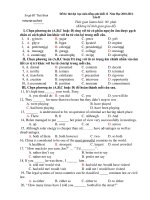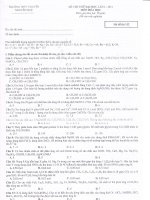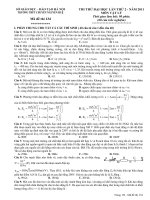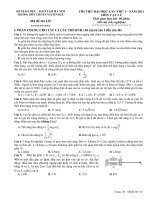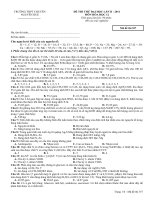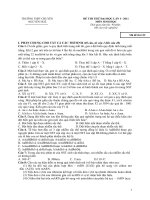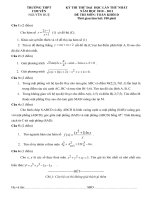- Trang chủ >>
- THPT Quốc Gia >>
- Ngoại Ngữ
ĐỀ THI THỬ THPT QUỐC GIA TIẾNG ANH CHỌN lọc THPT CHUYÊN NGUYỄN TRÃI lần 1
Bạn đang xem bản rút gọn của tài liệu. Xem và tải ngay bản đầy đủ của tài liệu tại đây (214.3 KB, 6 trang )
THPT CHUYÊN NGUY N TRÃI
L
ng Thùy LB s u t m và gi i thi u
Đ THI TH
THPT QU C GIA NĂM
Môn: Ti ng Anh
Th i gian làm bài: 60 phút
Choose A, B, C or D to indicate the sentence that is similar in meaning
to the one given
Question 1: It doesn’t matter how much you offer to pay, he won’t sell the
antique vase
A. Although you offer to pay him a lot, he won’t sell the antique vase.
B. Despite a lot of money you offer to pay, he won’t sell the antique vase.
C. He won’t sell the antique vase if you offer to pay him a lot of money.
D. However much you offer to pay, he won’t sell the antique vase.
Question 2: The best way to make them work hard is to promise them reward.
A. Promise them a reward and they will work hard.
B. If you promise to reward, they will word hard.
C. Reward them and make them work hard.
D. If they work hard, you should promise to reward them.
Question 3: I am not certain, but there may be about twenty applicants for the
job.
A. I am not sure if there are about twenty applicants for the job.
B. At a guess, there are about twenty applicants for the job
C. I guess that there are twenty applicants for the job
D. Twenty people are guessed to have applied for the job
Choose A, B, C or D to indicate the sentence that best combine the two
sentences given
Question 4: I bought an Italian pair of shoes for $150. They went missing after
two days.
A. I bought an Italian pair of shoes that went missing after two days.
B. The Italian pair of shoes that I bought for $150 went missing after two
days.
C. The Italian pair of shoes, which I had bought for $150, went missing after
two days.
D. My Italian pair of shoes that went missing after two days were bought for
150$.
Question 5: Ann paints landscape pictures. She finds it very pleasant.
A. Ann finds it pleasure to paint landscape pictures
B. Ann takes great pleasure in painting landscape pictures
C. Painting landscape pictures makes Ann feel pleasure
D. Ann feels pleasant in painting landscape pictures
Choose A, B, C or D to indicate the word that is OPPOSITE in meaning
to the underlined part in each of the following questions
Question 6: Mr.Smith’s new neighbors appear to be very friendly.
A. Inapplicable
B. hostile
C. amiable
D. futile
Question 7: Henry has found a temporary job in a factory.
A. Genuine
B. eternal
C. permanent
D. satisfactory
Choose A, B ,C or D to indicate the word that is CLOSEST in meaning to
the underlined part in each sentence
Question 8: Carpets from countries such as Persia and Afghanistan often fetch
high prices in the United States.
A. Artifacts
B. Textile
C. Pottery
D. Rugs
Question 9: Though many scientific breakthroughs have resulted from
mishaps it has taken brilliant thinkers to recognize their potential.
A. Incidental
B. misunderstandings
C. accidents
D. misfortunes
Read the following passage and choose A, B, C or D to indicate the
correct answer to each of the questions.
If we believe that clothing has to do with covering the body, and costume
with the choice of a particular form of garment for a particular use, then we can
say that clothing depend primarily on such physical conditions as climate, health,
and textile manufacture, whereas costume reflect social factors such as religious
beliefs, aesthetics, personal status, and the wish to be distinguished from or to
emulate our fellows.
The ancient Greeks and the Chinese believed that we first covered our
bodies for some physical reason such as protecting ourselves from the weather
elements. Ethnologists and psychologists have invoked psychological reasons:
modesty in the case of ancients, and taboo, magical influence and the desire to
please for the moderns.
In early history, costume must have fulfilled a function beyond that of
simple utility, perhaps through some magical significance, investing primitive
man with the attributes of other creatures. Ornaments identified the wearer with
animals, gods, heroes or other men. This identification remains symbolic in more
sophisticated societies. We should bear in mind that the theater has its distant
origins in sacred performances, and in all period children at play have worn
disguises, so as to adapt gradually to adult life.
Costume helped inspire fear or impose authority. For a chieftain, costume
embodied attributes expressing his power, while a warrior’s costume enhanced
his physical superiority and suggested he was superhuman. In more recent times,
professional or administrative costume has been devised to distinguish the
wearer and express personal or delegated authority; this purpose is seen clearly
in the judge’s robes and the police officer’s uniform. Costume denotes
power, and since power is usually equated with wealth, costume came to be an
expression of social caste and material prosperity. Military uniform denotes rank
and is intended to intimidate, to protect the body and to express membership in
a group. At the bottom of the scale, there are such compulsory costumes as the
convict’s uniform. Finally, costume can possess a religious significance that
combines various elements: an actual or symbolic identification with a god, the
desire to express this in earthly life, and the desire to enhance the wearer’s
position of respect.
Question 10: Psychological reasons for wearing garments include
A. protection from cold
B. availability of materials
C. prevention of illness
D. wishing to give pleasure
Question 11: Why does the author mention the police officer’s uniform?
A. To illustrate the aesthetic function of costume
B. To identify the wearer with a hero
C. To suggest that police are superhuman
D. To show how costume signifies authority
Question 12: The passage mainly discusses costumes in term of its
A. physical protection
B. religious significance
C. social function
D. beauty and attractiveness
Question 13: What is the purpose of the paragraph 1?
A. To describe the uses of costume
B. To contrast costume with the clothing
C. To trade the origins of costume
D. To point out that clothing developed before costume
Question 14: The word “scale” in line 23 refers to
A. symbolic identification
B. military rank
C. social position
D. the balance
Question 15: Which of the following would most likely NOT be reflected in a
person’s costume, as it is defined in the passage?
A. Having a heart condition
B. Playing in a baseball game
C. Working in a hospital
D. Participating in a religious ceremony
Question 16: It can be inferred from paragraph 3 that
A. The function of costume has become very sophisticated
B. Children like to identify with other creature by wearing costumes
C. Primitive people wore cloths only for sacred performances
D. Costume no longer fulfills a function beyond simple utility
Read the following passage and mark the letter A, B, C, or D on your
answer sheet to indicate the correct work for each of the blanks.
Michael Faraday
During the last 400 years, most scientists have (17) ________on
mathematics in their development of their inventions or discoveries. However,
one great British scientist, Michael Faraday, did not make (18)__________of
mathematics. Faraday, the son of a poor blacksmith, was born in London in 1791
and had no (19) _________beyond reading and writing.
In 1812 Faraday was hired as a bottle washer by the great chemist
Humphry Davy. Later, Faraday became a greater scientist than Davy, making the
last years of Davy's life embittered (20) __________ jealousy. Faraday made the
first (21)__________motor in 1821, a device that used electricity to produce
movement.
Question 17:
A. relied
B. insisted
C. based
D. elaborated
Question 18:
A. usage
B. advantage
C. use
D. utilization
Question 19:
A. instruction
B. knowledge
C. training
D. schooling
Question 20:
A. from
B. with
C. by
D. at
Question 21:
A. electric
B. electrical
C. electricity
D. electrician's
Choose A, B, C or D to indicate the correct answer to each of the
following questions.
Question 22: Drinking water excessive amounts of fluorides may leave a stained
or mottled effect on the enamel of teeth.
A. containing
B. including
C. made up of
D. composed of
Question 23: She gave me a ____________box.
A. small square jewellery metal
B. small metal square jewellery
C. small square metal jewellery
D. small jewellery square metal
Question 24: Ben: Our team has just won the last football match
Ann: __________
A. Good idea. Thanks for the news.
B. Yes. I guess it’s very good.
C. Well, that’s very surprising!
D. Yes, it’s our pleasure.
Question 25: She pays an enormous insurance premium on the family heirloom,
her most _______ possession.
A. worthless
B. valueless
C. honourable
D. treasured
Question 26: She____________her success to hard work.
A. described
B. devoted
C. blamed
D. ascribed
Question 27: I refuse to believe a word of it; it’s a cock-and-___________story.
A. hen
B. goose
C. bull
D. duck
Question 28: ________, I decided to stop trading with them.
A. Despite of the fact that they were the biggest dealer
B. Though being the biggest dealer
C. Being the biggest dealer
D. Even though they were the biggest dealer
Question 29: When Mr Spendthrift ran out of money, he his mother for help.
A. fell back on
B. fell upon
C. fell behind
D. fell in with
Question 30: It’s funny you should say that. I’ve just had the thought. A. like
B. identical C. alike D. similar
A. like
B. identical
C. alike
D. similar
Question 31: Newspaper publishers in the States have estimated reads a
newspaper every day.
A. nearly 80 percentage of the adult population who
B. it is nearly 80 percent of the adult population
C. that nearly 80 percentage of the adult population
D. that nearly 80 percent of the adult population
Question 32: Ann: Ben: Thanks. I will write to you when I come to London.
A. God bless you! B. Have a nice trip! C. Better luck next time!
D.
Have a go!
Question 33: The dead man’s widow said he had had a/an that he would be
killed in an accident.
A. knowledge
B. experience
C. presentiment
D. warning
Question 34: If you book in advance you will certainly have a better table at
our restaurant.
A. mostly
B. almost
C. most
D. the most
Question 35: Never_________him stand on the deserted station platform.
A. will I forget to see
B. I will forget to see
C. will I forget seeing
D. I will forget seeing
Choose A, B, C or D t indicate the word that differs from the rest in the
position of the main stress in each of the following questions.
Question 36:
A. enthusiasm
Question 37:
A. perfect
B. generator
C. mischievous
D. reference
B. sincere
C. mature
D. technique
Choose A, B, C or D to indicate the word where underlined part is
pronounced differently in each of the following questions.
Question 38:
A. extinctin
Question 39:
A. amount
B. exhibit
C. exhaustion
D. exist
B. countable
C. country
D. around
Read the following passage and mark the latter A, B, C, or D on your
answer sheet to indicate the correct answer to each of the questions.
A survey is a study, generally in the form of an interview or a questionnaire,
that provides information concerning how people think and act. In the United
States, the best-known surveys are the Gallup poll and the Harris poll. As anyone
who watches the news during presidential campaigns knows these polls have
become an important part of political life in the United States.
North Americans are familiar with the many "person on the street" interviews on
local television news shows. While such interviews can be highly entertaining,
they are not necessarily an accurate indication of public opinion. First, they
reflect the opinions of only those people who appear at a certain location. Thus,
such samples can be biased in favorof commuters, middle-class shoppers, or
factory workers, depending on which area the newspeople select. Second,
television interviews tend to attract outgoing people who are willing to appear
on the air, while they frighten away others who may feel intimidated by a camera.
A survey must be based on a precise, representative sampling if it is to genuinely
reflect a broad range of the population.
In preparing to conduct a survey, sociologists must exercise great care in
the wording of questions. An effective survey question must be simple and clear
enough for people to understand it. It must also be specific enough so that there
are no problems in interpreting the results. Even questions that are less
structured must be carefully phrased in order to elicit the type of information
desired. Surveys can be indispensable sources of information, but only if the
sampling is done properly and the questions are worded accurately.
There are two main forms of surveys: the interview and the questionnaire.
Each of these forms of survey research has its advantages. An interviewer can
obtain a high response rate because people find it more difficult to turn down a
personal request for an interview than to throw away a written questionnaire. In
addition, an interviewer can go beyond written questions and probe for a
subject's underlying feelings and reasons. However, questionnaires have the
advantage of being cheaper and more consistent.
Question 40: According to the passage, the main disadvantage of person-onthe-street interviews is that they
A. are not based on a representative sampling
B. are used only on television
C. are not carefully worded
D. reflect political opinions
Question 41: It can be inferred from the passage that one reason that
sociologists may become frustrated with questionnaires is that
A. respondents often do not complete and return questionnaires
B. questionnaires are often difficult to read
C. questionnaires are expensive and difficult to distribute
D. respondents are too eager to supplement questions with their own opinions
Question 42: According to paragraph 3, which of the following is most
important for an effective survey?
A. A high number of respondents
B. Carefully worded questions
C. An interviewer's ability to measure respondents' feelings
D. A sociologist who is able to interpret the results
Question 43: The word "elicit" in line 18 is closest in meaning to
A. compose
B. rule out
C. predict
D. bring
Question 44: What does the passage mainly discuss?
A. The history of surveys in North America
B. The principles of conducting surveys
C. Problems associated with interpreting surveys
D. The importance of polls in American political life
Question 45: According to the passage, one advantage of live interviews over
questionnaires is that live interviews
A. cost less
B. can produce more information
C. are easier to interpret
D. minimize the influence of the researcher
Question 46: Which of the following terms is defined in the passage? A. Survey
(line 1) B. Public opinion (line 8)
A. Survey (line 1)
B. Public opinion (line 8)
C. Representative sampling (line 13)
D. Response rate (line 22)
Question 47: The word "exercise" in line 15 is closest in meaning to
A. utilize
B. consider
C. design
D. defend
Choose A, B, C or D to indicate the underlined part that needs correction
in each of the following questions.
Question 48: Although most species of small birds gather in groups at(A)
feeders provided by bird-watchers, the bright red cardinals(B) usually appears
alone or(C) with its(D) mate.
Question 49: Henry David Thoreau was an(A) American writer who is(B)
remembered for(C) his faith in religious significance of the nature(D).
Question 50: Proteins are made up of(A) folded irregularly(B) chains, the
links(C) of which(D) are amino acids.
1D
11D
21A
31D
41A
2B
12C
22A
32B
42B
3B
13B
23C
33C
43D
4C
14C
24C
34B
44B
ÁP ÁN
5C
6B
15A
16B
25A
26D
35C
36A
45B
46A
7C
17A
27C
37A
47A
8D
18C
28D
38A
48D
9C
19D
29A
39C
49D
10D
20B
30D
40A
50B
